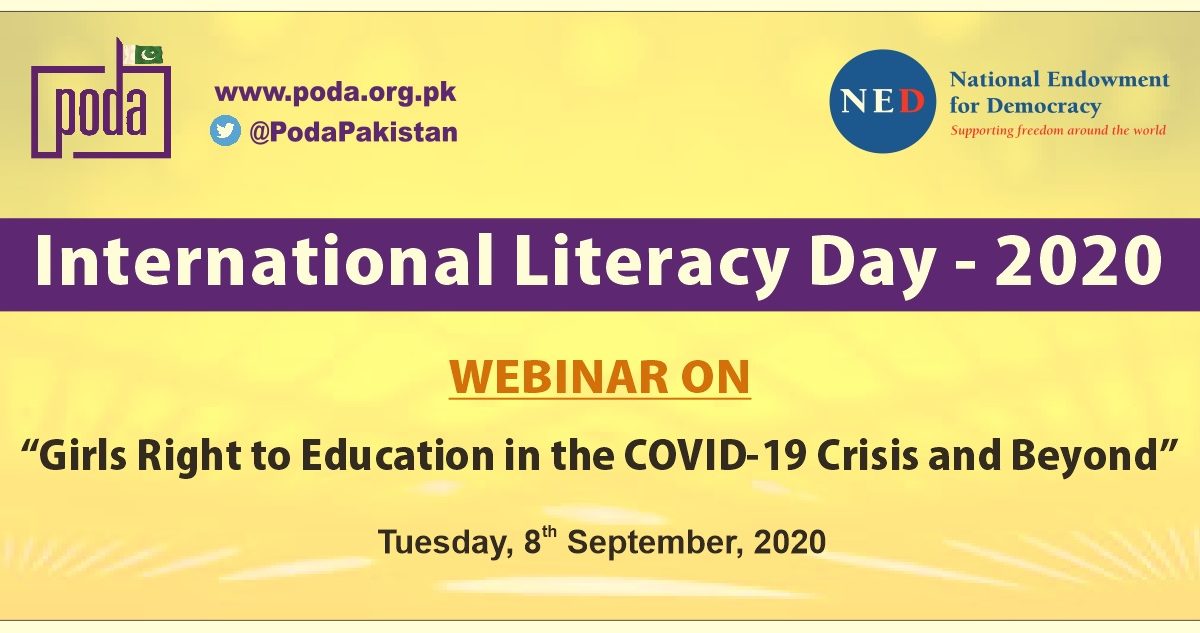
PODA-Pakistan with the support of the National Endowment for Democracy (NED) organized a webinar on ‘Girls Right to Education in the COVID-19 Crisis and Beyond’ on the occasion of International Literacy Day on September 8, 2020. Over 40 rural women leaders, students, teachers, educationists, representatives from civil society organizations, and government participated in the webinar. The aim of the event was to deliberate on the key issues and challenges in girls right to education and what steps can be made to ensure girls’ right to education in the post-COVID-19 scenario.
Dr. Rubina Fareed, Member, National Commission on the Rights of the Child (NCRC) shared that education plays an essential role in the creation of skills and human capital, which leads to higher economic growth and prosperity of the country. The literacy rate in Pakistan is explained as the percentage of people that have the ability to read and write. She emphasized on the importance of girls’ right to education and suggested that every school should have a nurse to teach the girls about their health issues. And every school should have a psychologist or there should be training programs for teachers on psychology so they can understand the psychological issues of school children.
Ms. Zehra Arshad, National Coordinator, Pakistan Coalition for Education (PCE) shared key findings recent study on girls’ education in Pakistan conducted by PCE. She shared that there is a huge gender disparity in the literacy rate, the overall literacy rate is 57 percent, and only 49 percent of women are literate in Pakistan. When it comes to the women living in rural areas the rate is alarmingly low of 38 percent. Due to low literacy rate Pakistan is ranked 152 out of 189 countries in the United Nations Development Program’s (UNDP) Human Development Index (HDI) ranking 2019. Access to education is a problem, particularly for girls living in rural areas of Pakistan. About 22.8 million of Pakistan’s children between ages 5-16 are out of school. More than 12 million of these are girls. The COVID-19 outbreak has exposed its profound inequities in the educational system in Pakistan.
Ms. Khalida Ahmad, Educationist said that COVID-19 pandemic is also set to have a disastrous impact on the already struggling literacy rate in Pakistan. The schools have not opened for a single day in the educational year 2020-21 and it remains extremely challenging to make online education work in low resourced settings. The closure of educational institutions due to COVID-19 has directly impacted 40 million school going learners from pre-primary and primary to higher secondary levels apart from the Out of School Children in the country. Girls are twice as likely to be out of school and face greater barriers to continuing their education. There are serious problems in the education sector of Pakistan. A large number of children are not going to the schools; those who are going to schools are at the risk of dropout and are not learning properly.
She also shared that the state of Pakistan has promised to achieve Sustainable Development Goals (SDGs) including SDG 4 to ensure inclusive and equitable quality education and promote lifelong learning opportunities for all’. There is a lack of implementation in achieving SDG 4.
The participants urged that the government should take necessary steps to ensure implementation of Article 25-A ‘Right to Education’ and SDG 4 to ensure inclusive and equitable quality education and promote lifelong learning opportunities for all’. Pakistan should formulate a comprehensive and inclusive policy in order to address the key issues that are hurdles in the attainment of a 100 percent literacy rate, zero drop-out ratio, and effective implementation of the National Education Policy Framework. There is also a need to address the socio-cultural hurdles and to sensitize the parents that the girl’s education is equally important as boys and the government should adopt a rights-based approach to provide education to all children. A special focus should be given to enroll 22.8 million out of school children through enrollment campaigns at the national level.
